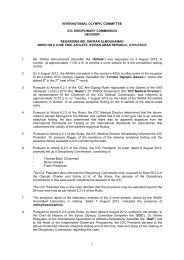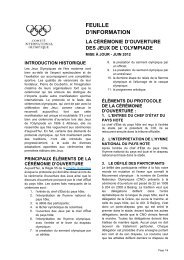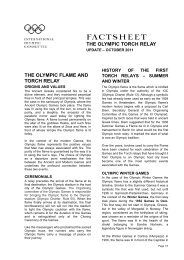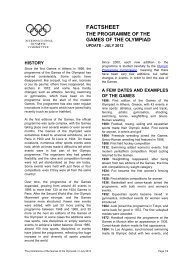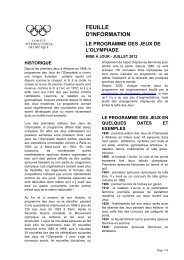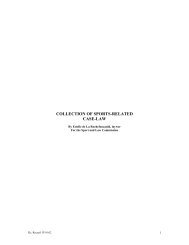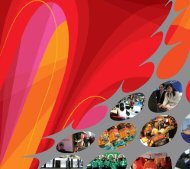8th WORLD CONFERENCE ON SPORT AND THE ENVIRONMENT
8th WORLD CONFERENCE ON SPORT AND THE ENVIRONMENT
8th WORLD CONFERENCE ON SPORT AND THE ENVIRONMENT
You also want an ePaper? Increase the reach of your titles
YUMPU automatically turns print PDFs into web optimized ePapers that Google loves.
<strong>8th</strong> World Conference on Sport and the Environment<br />
International Cooperation and Development Department<br />
Report<br />
Three claims were made:<br />
1) Capitalism is adept at the exploitation of labour and the environment as well as shifting<br />
externalities from the balance sheets of business to that of citizens. Despite these negatives,<br />
capitalism also possesses the key driving force for change: innovation. By being dynamic and<br />
embracing innovation, society can use capitalism to redraw its priorities to include environmental<br />
sustainability.<br />
2) Recognition that such a shift does not need to come at the sacrifi ce of vital industries that<br />
support the economy. Drawing on numerous examples, such as California salmon fi shing and<br />
the infestation by the mountain pine beetle in the forests of British Columbia, Mr Van Dyck was<br />
emphatic that the consequences of not innovating are more economically devastating.<br />
3) The time for innovation is now. Business should begin to recognise that the economic leaders<br />
of yesterday and today are not necessarily going to be the leaders of tomorrow. It is innovation<br />
which raises economic leaders to the forefront. Those who embrace clean technology and green<br />
goals will position themselves as global economic leaders in the future.<br />
Mr Van Dyck argued that this current state of economic uncertainty is the exact time to move from<br />
a perspective of “me” to a culture of “we.” In doing so there is every reason to believe that this will<br />
encourage environmental sustainability without having profound economic sacrifi ces.<br />
Key quotes from Mr Van Dyck:<br />
“We must bring the green opportunity to everyone.”<br />
“It is not green versus green [economy versus ecology]. But green is green.”<br />
“We cannot afford to fail. Unlike the current economic crisis we are in, where we can print more<br />
and more money, we cannot print more rain for drought areas, we cannot print more rainforest<br />
in the Amazon, we cannot print more salmon. We cannot afford to fail.”<br />
“The green tide must lift all ships… green for all.”<br />
“We need to bring the work that needs to be done to those who need the work the most.”<br />
“We must move from me to we… for “green for all”… We must put the “eco” back in economy.”<br />
Discussion:<br />
Mr Van Dyck was asked about the “As You Sow” programme and how investor and management<br />
behaviour changes can occur.<br />
Mr Van Dyck outlined success stories involving Home Depot and Disney, both of which were<br />
unaware that there were sustainable options for production in their specifi c industry.<br />
A delegate asked about the notion of “reset” and how changes can occur.<br />
Mr Van Dyck responded that the shift can develop because business and government both<br />
recognise the economic benefi ts derived from environmental sustainability.<br />
A delegate asked about where they see innovation coming from.<br />
Mr Van Dyck suggested that it will come from groups like consultants making change,<br />
and events such as those developed by the International Olympic Committee, and most<br />
importantly individuals.<br />
A delegate indicated that during economic downturns cities begin to cut back on recycling<br />
facilities and wondered if investment funds could modify this trend?<br />
Mr Van Dyck was unsure of any specifi c programme to subsidise recycling; however, there<br />
are ethical funds which promote sustainable companies.<br />
A delegate asked about how the developing world should view this new sustainable vision. Is<br />
sustainable development going to be limited to the developed economies?<br />
Mr Van Dyck agreed 100% that the evolution of capitalist ideas to include environmental<br />
sustainability is of global reach and not limited to the developed world. New design parameters<br />
and full-cost integration needs to be implemented globally.<br />
Page 28 / 80





